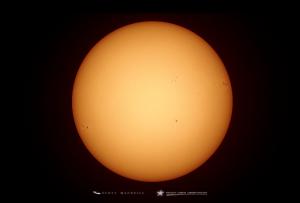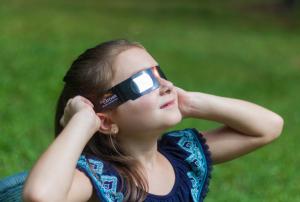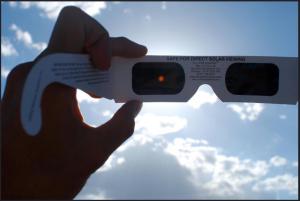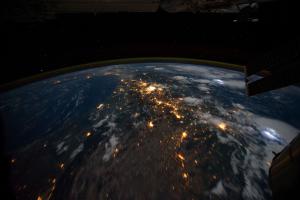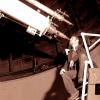Celebration of Space - March 29, 2024
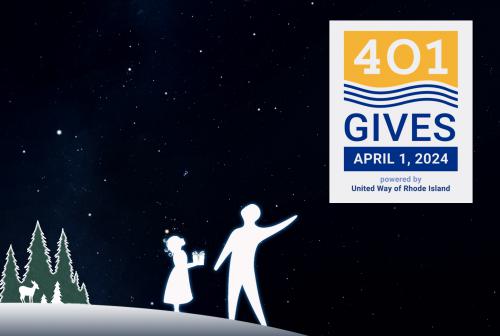
401Gives, a day for Rhode Island to support Rhode Island non-profit organizations, is occurring on Monday, April 1, 2024. Get involved!
On Monday, April 1, 2024, the annual 401 Gives fundraiser is happening in Rhode Island. It is a day for Rhode Islanders to support Rhode Island non-profits that are making an impact in our communities. The event is organized by the United Way of Rhode Island, and is a very important fundraiser for Frosty Drew Observatory and Science Center. When you donate to Frosty Drew, you are enabling us to continue the fantastic programs and events that we are known for, but your support also allows us to build out new programs, additional presentation stations, and amplify our message of inspiration and enlightenment. The first person to stand on Mars is walking around on Earth right now, they do not know it is them, and they are currently a child. At Frosty Drew we want all children to know and understand that they have that opportunity! We want to create the spark that inspires them to reach for the sky.
Frosty Drew Observatory and Science Center will be hosting an online event on Monday. We will broadcast live and archived content starting at 9:00 am on our website and on our YouTube, including live views of the Sun as we prepare for our live broadcast of the April 8, 2024 eclipse. We’ll also show personal messages from the Frosty Drew Astronomy Team members, archived telescope views of Saturn, Jupiter, Venus and more.
We will send out another email about our fundraiser on Monday morning. But in the meantime check out our event page, and our 401 Gives Campaign to learn about our plans for the day and what the different donation levels are that we are offering. Thank you for making Frosty Drew what it is today!
The fantastic total solar eclipse on April 8, 2024, is only ten days away, and the usual eclipse craze is starting to kick in. The word on the street is that extended forecasts are calling for sunny conditions for the eclipse in Charlestown, RI, but we’ll have a better idea as the date approaches. Since we are in the final stretch to prepare for the eclipse, here are a few things to note.
If you do not have a direct viewing aide, now is the time to get one! In Rhode Island, there are no locations or times that the eclipse will be safe to view with the naked eye. This is because the path of total eclipse will not pass through Rhode Island. We will still experience a stunning eclipse, but the greatest eclipse we see will be 89% - 92% partial eclipse. Even though a significant portion of the Sun will be covered by the Moon, it is still unsafe to view with the naked eye. Using eclipse glasses or an eclipse viewer from a reputable manufacturer will allow for direct observation. Additionally if you have binoculars or a telescope, purchasing a solar filter that attaches to the aperture end of the device will also allow for higher resolution views of the Sun.
It is important to be aware of what you are purchasing because there are a lot of fake eclipse glasses out there in the marketplace. It’s not as easy as stating “make sure they are ISO 12312-2 compliant” or “make sure they are from a reputable manufacturer”, like we stated in the last paragraph. This is because counterfeits will likely have the ISO 12312-2 stamp on them, and some have been noting that they were made by a reputable manufacturer, even though they weren’t. The best way to check your glasses or direct viewing device is to test it incrementally. First, follow the steps we show in this video. Additionally, you will want to try on your eclipse glasses outside on a sunny day, without looking at the Sun. Just look around the landscape while wearing them. Nearly everything outside should NOT be visible to you when wearing the glasses aside from very bright reflections of the Sun, which should appear extremely dim. If your eclipse glasses feel like you are wearing strong sunglasses, they are not safe! If you have made it this far without detecting a problem, then you can quickly try them out with the Sun, for very short periods of time. Does the Sun appear uncomfortably bright? Is the Sun so bright that it is similar to looking at a bright light bulb or headlights? These would indicate that the glasses are unsafe to use. The Sun should appear clearly and comfortably in eclipse glasses. You should be able to faintly see sunspots on the solar photosphere, if any that are large enough to see are present, as well as detail on the Sun. Here is an example of what the Sun should look like in eclipse glasses (note that the background light is just a reflection off of the glasses). Here is an example of what the Sun may like like in glasses that are inadequate.
Many libraries in the state have eclipse glasses available for you. I have also seen some at Lowes hardware stores. When purchasing any glasses, always test them with the steps listed above and in the video we linked to. If you are unable to get a set of eclipse glasses or other safe direct viewing aides, there are many other options for you, including visiting an observatory, museum, or library that may be hosting an event. You can also create and use indirect viewing devices like camera obscuras, or solar projectors. Here is an article we wrote that offers up some ideas. Regardless of how you observe, be sure to place a high priority on the preservation of your vision so you end up with a fantastic lasting memory, not a lasting vision impairment.
Evening passes of the International Space Station will wrap up this weekend as the station orbits out of our region’s prime viewing hours. Once this happens there will be a couple of weeks without any visible passes of the station, then on April 19th, the station will commence early predawn morning passes. Here are the remaining visible passes of the ISS for this weekend:
Fri, Mar 29 at 8:19 pm, starting in the NW, rising to 76°, heading towards the ESE, and into orbital sunset ← Awesome pass!
Sat, Mar 30 at 9:08 pm, starting in the W, rising to 22°, and into orbital sunset
Sun, Mar 31 at 8:20 pm, starting in the WNW, rising to 37°, heading towards the SSE, and into orbital sunset.
Take a moment to step outside this weekend to catch these last passes of the ISS in the evening hours. Even though the ISS is departing the evening sky over our region, China’s Tiangong station will be returning on April 16th. Evening passes of the ISS will start again on May 12th.
- Author:
- Scott MacNeill
- Entry Date:
- Mar 29, 2024
- Published Under:
- Scott MacNeill's Columns

